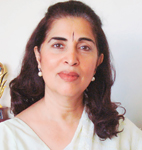
Dr. Urvashi Sahni
Founder, Study Hall Educational Foundation
The unspeakable horror of the brutal gang rape and murder of a 23-year-old girl in the capital of the world’s largest democracy, India, on December 16th has brought to the forefront the cruel, fatal, highly discriminatory gender norms prevalent in a country that now claims to be one of the worlds rising economic stars. A window has opened for responses that challenge these gender norms through critical dialogues and empowering education.
There is probably no woman in the country regardless of caste, class, religion or region who has not been the target of sexual harassment in some form or other at home, in the work place or on the street. India has one of the lowest sex ratios in the world, one of the highest rates of incestuous sex abuse, and the worst gender differential of children aged between 1 to 5-years-old such that girls are 75 percent more likely to die than boys. Approximately 1 million girls arekilled in the womb before they are born, 25,000 die due to dowry related deaths and the gory list goes on and on. We are not a nation that values our daughters, or one that knows how to keep them safe. They are neither safe in the before birth, or at home or in the streets. And we do nothing about it! The nationwide protests are protesting just this. They are protesting against an apathetic administration, against sexist mindsets of the police, the judiciary and the legislature. They are demanding more just laws, speedier redressal in courts of law and conviction of criminals. What is noteworthy is the large number of students, men and women who are on the streets, braving lathi charges (administered by stick) and tear gas to make their voice heard. It has now been over 20 days and the protests continue. This continuous, nationwide, mass protest in light of the gang rape- on the scale of the Tahrir square uprising – is not only unexpected, especially in a country like India, it is unprecedented and historic.
While I can only hang my head in shame at this awful crime, I will admit to a sense of exhilaration at the huge response it has generated among the nation’s youth, raising many gender related issues, leading to discussions and debates spanning both the length and I am an educator and the head of a school in Lucknow, the capital of Uttar Pradesh. Last night I went to light a candle in a city park. Our school is closed for the winter, but many of our students were at the park lighting candles and engaging in critical dialogues.
The media is also making sure the issues do not disappear from the spotlight as is often the case. It is engaging voices from all sectors of society including students, civil society, academia, political parties, the police, the judiciary and the government. Everywhere people are discussing gender discrimination, gender norms, and the sad status of women and girls in India. Nirbhaya’s (the pseudonym given to the deceased rape victim) brutal rape and murder should not pass in vain. We hope that this is the turning point. Everyone is being forced to sit up and take notice of the millions of girls who are being attacked, raped, killed every day all over the country.
Along with the strong measures that the government should take to ensure the safety of our women, as a long term measure we should be working at educating our young people towards more equitable gendered perceptions. Everyone is clamoring for a change of gendered mindsets and I add my voice to the uproar – we should include gender studies in the post-primary curricula of all schools for both boys and girls. This is one way of ensuring that future generations of men will grow up respecting women and their right to bodily and sexual integrity. If it is important to give our children an understanding of math and science, it is equally important for them to understand equality of gender. Educators have an important role to play in creating a safer, more just world for girls and women.
Also featured on : Global Campaign for EDUCATION, United States Chapter
 DONATE
DONATE


 Volunteer
Volunteer
 Work With Us
Work With Us

It is difficult being a girl in India. Specially in Bharat. She is not given a choice to be even born.
Education and moral teaching in the primary stages is a must for the boys and the girls in the current times but who are going to teach these morals to a driver conductor or any other person like those ?? The so called “Educated” society knowing “Morals” standing there on the road watching all the “tamasha” during the brutal case of nirbhaya did nothing but just stood there and watched saying “why should i care ?” who is going to this carefree outlook of this Educated society of ours!